In Pakistan, autism is perhaps the most misunderstood neurological condition. While some people term it a “disease” others see it as an attack of “supernatural forces”. In both the cases, the autistic child or adult is conveniently ostracised by the society, which refuses to understand the fact that autism is not a medical condition requiring a “cure”.
In fact, according to the NHS, people with autism are capable of living normal lives however, they require extra assistance. The most common characteristics of people with autism are difficulty in social communication and comprehending emotions, tackling bright lights and loud noises, and processing information.
Dr Turab Zehra, a fellow at the Department of Paediatric Development and Behavior at the Aga Khan University Hospital, and Dr Sidra Kaleem, Associate Professor in the Department of Paediatrics and Child Health at Aga Khan University Hospital, Karachi, revealed that the autism spectrum disorder (ASD) was a condition that affected the communication and behavior of individuals.
According to these experts, the exact statistics of people with autism after the age of 18 are not available however, the World Health Organisation (WHO) claims that one in 100 young people may have autism.
Citing a report by the Centers for Disease Control and Prevention, they revealed that in 2017, 2.21 per cent of people aged 18 to 84 years worldwide had autism. “Unfortunately, there is no authentic data on autism in Asia, including Pakistan. Some studies claim that 0.36 per cent of people have autism in Asia. However, autism has been diagnosed more in recent years,” said the experts.
Dr Abdul Malik, General Secretary at the Neurology Awareness and Research Foundation estimated that more than 3.5 million people had autism in Pakistan. “In children, autism manifests in the form of behavioral irritability and speech difficulties. Furthermore, the ability to learn and understand is also reduced. In 25 per cent of cases medication is required, however, 75 per cent of the affected people are given other therapies, including communicative occupational therapy to assist them,” said Dr Malik.
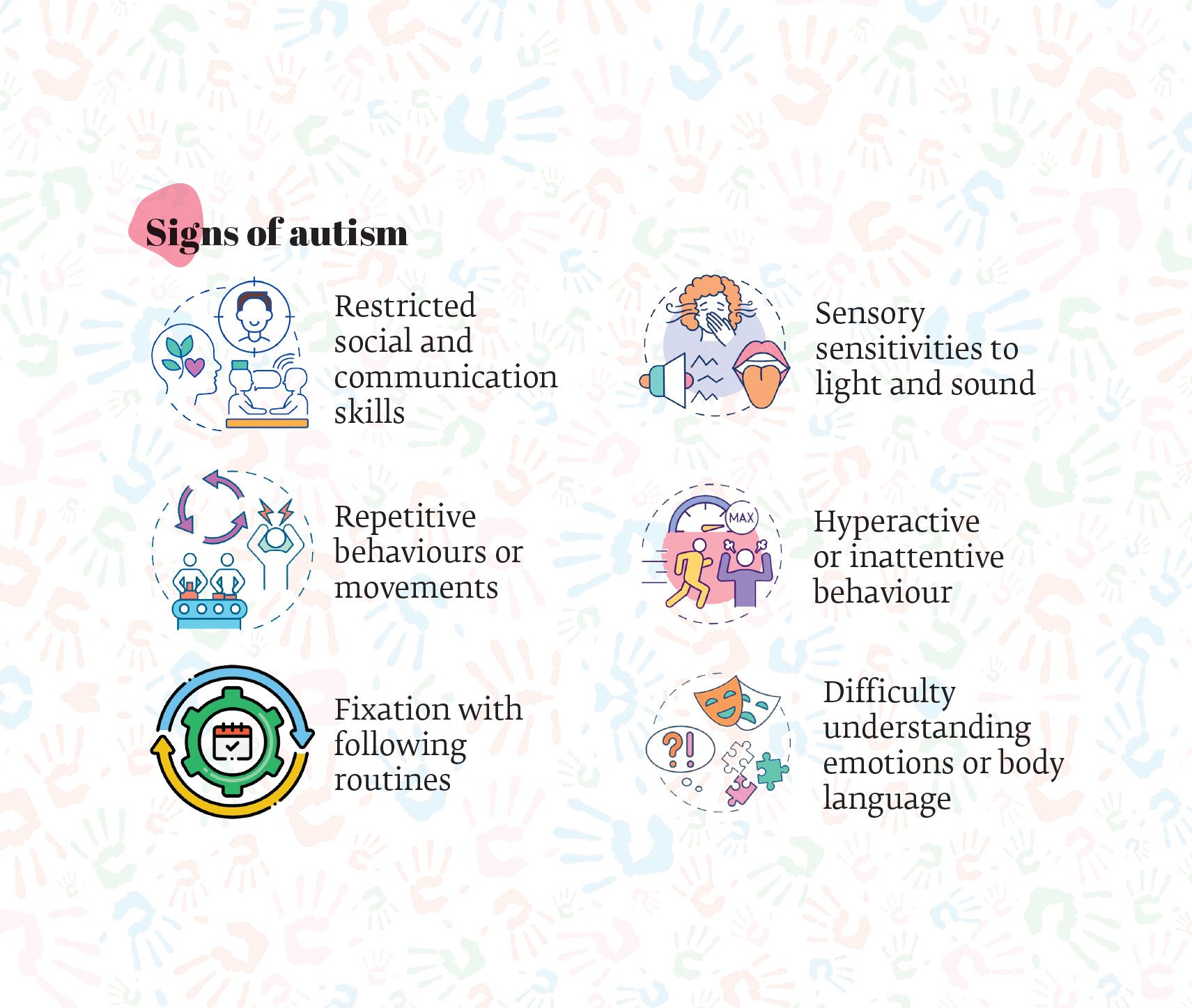
Types of autism and barriers to diagnosis
Contrary to popular belief, autism is not a single condition affecting the neural functioning of an individual. In fact, autism is more accurately referred to as the autism spectrum disorders or ASD since the specific traits manifesting in individuals living with the developmental disability appear to lie across a vast spectrum of neurodivergence.
Three common variations reported among autistic individuals include high-functioning autism also known as Level 1 ASD, middle level autism or Level 2 ASD and low-functioning autism, better known as Level 3 ASD. Individuals with Level 3 ASD present with the classic symptoms most people are stereotypically associated with autism. They may either be entirely mute, have trouble with their speech, or have difficulty controlling aggressive behaviours.
In light of their noticeable symptoms, individuals born with Level 3 ASD are often diagnosed during childhood since they require the highest level of support. On the contrary, those born with Level 1 ASD often escape a diagnosis until several years after they appear “normal” to parents and even excel in their academics. Later on in life, when they face issues maintaining personal and professional relationships, or have poor mental health, the majority are unaware of the root cause of their exhausting existence.
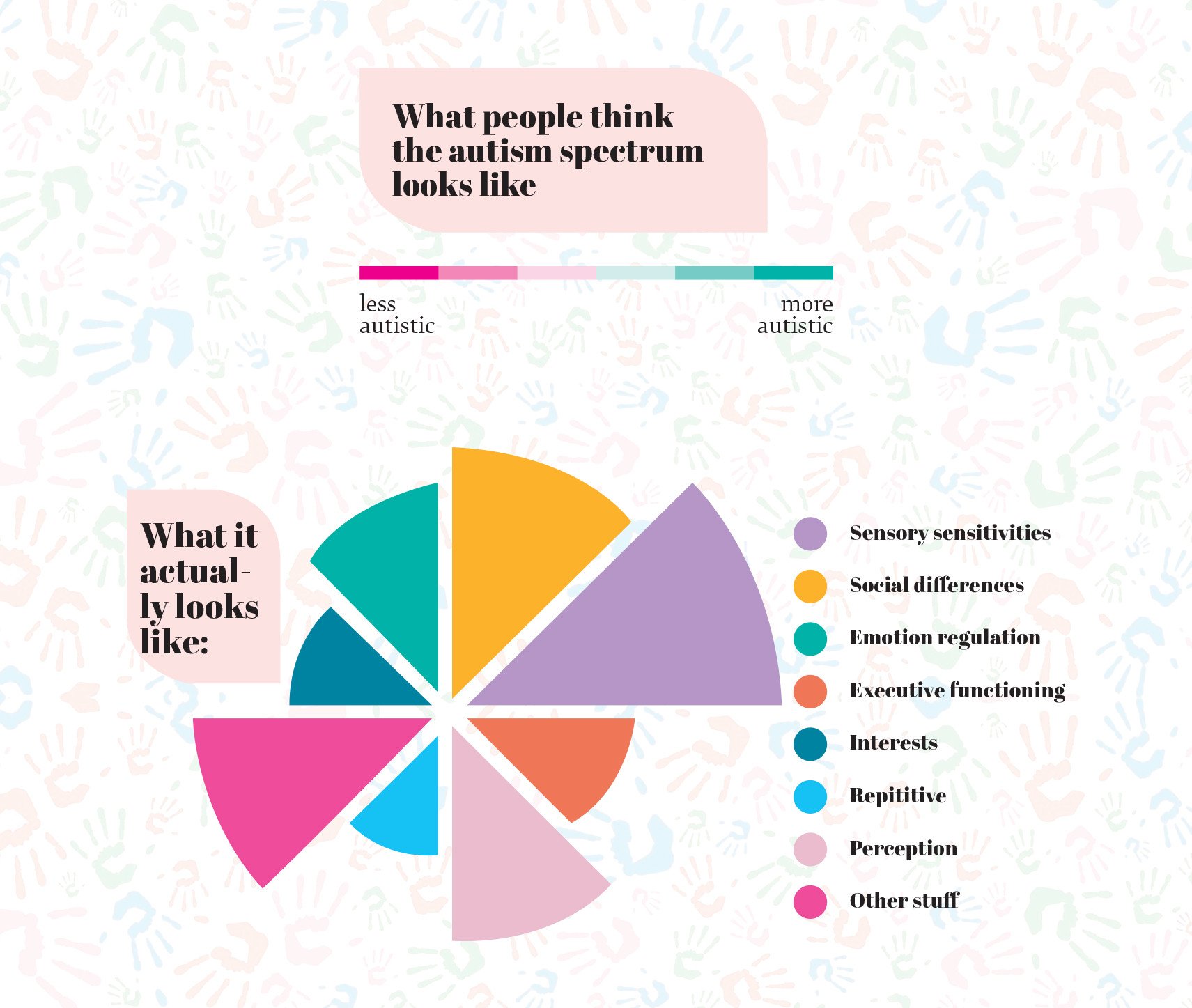
Surviving an allistic world
“Imagine trying to operate an iPhone with instructions for an Android. The world would probably consider the phone a broken Android, but only people with specialised knowledge can identify it as a different system altogether.”
In his Ted Talk, Kip Chow, a neurodiversity activist, described the complexity of everyday life for an autistic person with a different brain operating system. Chow, who himself escaped an autism diagnosis for several years, believed that autistic people navigating through the allistic world often felt that they were ‘broken’ since their unique ways of social communication and information processing were frequently misunderstood by others.
Similar were the struggles of Kashif’s brother, who was ostracised by his family purely because he was different. “Since childhood, my brother's behavior was eccentric. Whenever we would have guests at home, he would stare at them constantly. As a result, people would feel uncomfortable around him and my parents were always embarrassed. Eventually, we could not find a suitable match for our younger sister since the suitor’s family used to get triggered by my autistic brother,” shared Kashif, whose brother escaped an autism diagnosis until adulthood.
According to Dr Zehra, autistic people often struggled in their social relationships, educational endeavours and employment contracts since their communication skills were different.
“Therefore, autistic people face severe difficulties in getting a job, due to which their average unemployment rate is quite high. Furthermore, the stigmatisation of autistic people in our society also hinders their timely diagnosis and treatment,” noted Dr Zehra.
Similarly, Nabila Chaudhry, Head of the Rising Sun Education & Welfare Society, highlighted the lack of attention given to adults with autism, in terms of facilitating their education, skill training, employment and transition into adulthood.
“When it comes to the skills training and employment of autistic adults, there are a few guiding principles that must be followed. Autistic people like structure, predictability and clearly stated instructions; whether verbal, written or pictorial. We also have to take into account their sensory preferences,” advised Chaudhry.
According to Autism Spectrum News, sensory sensitivities are a significant hurdle for autistic employees at workplaces therefore, companies should provide quiet zones, noise-cancellation headphones, adjustable lighting and ergonomic furniture to boost their productivity.
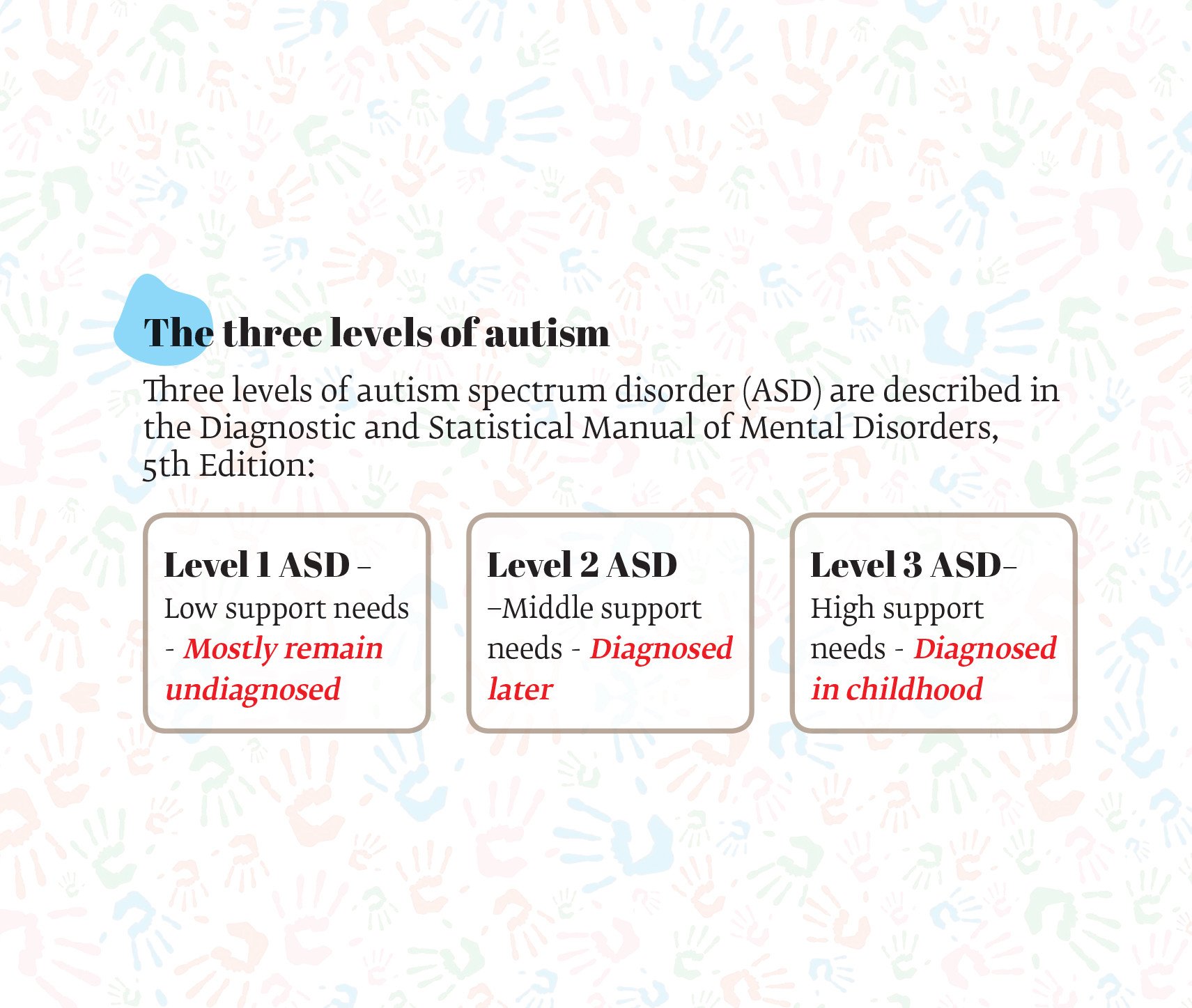
Autism vs anxiety or depression
For a moment, picture yourself in the shoes of a person with undiagnosed autism. Your family and relatives think you’re anti-social because you can’t tolerate the glaring lights and deafening music at weddings. Your small group of friends ditches you since you don’t get their jokes and are not fun to hang out with. Your teacher thinks you’re dumb because you can solve a complex math equation but can’t read the classroom clock. Your prospective employers reject your applications since you can’t brag about your qualities. The world around seems like a big jigsaw puzzle, with you as the odd piece. Perhaps you too would develop some mental illness.
According to Autistica, a UK-based autism research charity, approximately 80 per cent of people on the autism spectrum experience mental health issues especially anxiety and depression during the course of their lifetime. While some experts argue that such startling figures arise due to inherent differences in brain chemistry, others believe that the stress of communicating with neurotypical people leads individuals with autism to develop anxiety and depression over time.
Apart from the taboo associated with mental health in Pakistan, what further complicates the diagnosis of Level 1 or Level 2 ASD is the fact that anxiety and depression, the two common symptoms of autism, are commonly treated as conclusive mental illnesses by psychologists rather than the covert indicators of a chronic developmental disability like autism.
Dr Salahuddin Mobin, a psychologist confirmed that mental exasperation plagued autistic adults. “Since people with autism have an altered brain functioning and are also treated unjustly by society, they can suffer from some mental ailment,” observed Dr Mobin.
Concurring with Mobeen, Dr Abdul Malik, confirmed that mental ailments were common among autistic people. “Some autistic people have high levels of anxiety, depression and hyper arousal while others suffer from moderate forms. Either way, people with autism remain psychologically disturbed,” noted Dr Abdul Malik
Statistics published by PubMed Central for Pakistan have revealed that the overall prevalence of anxiety and depression based on community estimates are 33.62 per cent. Analyzing the data in terms of gender showed that 21.7 per cent men and 45.5 per cent women presented with the conditions. Unfortunately, no one can tell what percentage of these people are actually autistic.
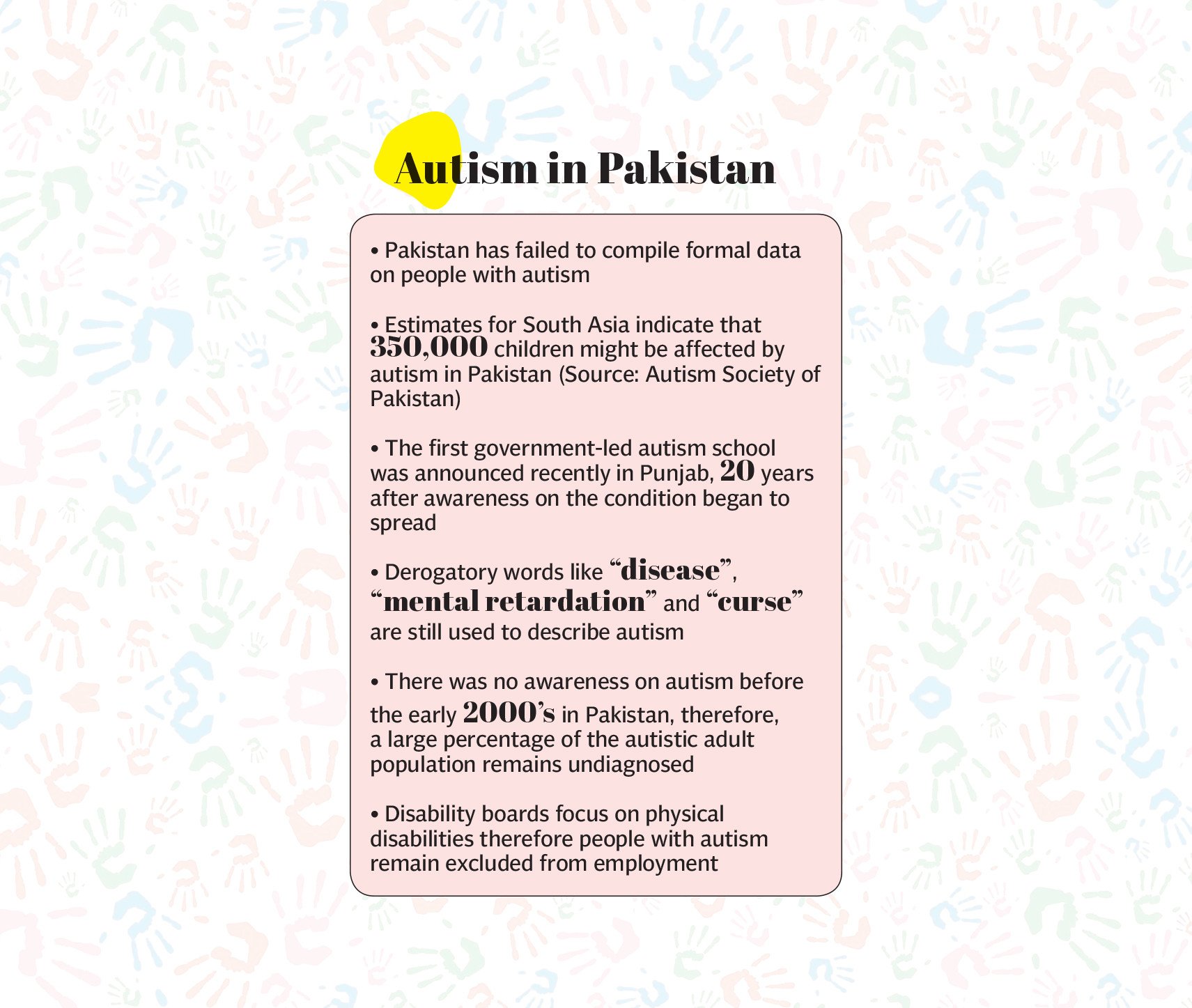
“Masking” of symptoms
The diagnosis of a condition, whether physical or psychological, requires the presentation of some signs and symptoms. However, when the person with the condition actively starts hiding all the classical indications in order to appear ‘normal’, no family member or doctor can tell that they even have it. Such is the case with the majority of autistic women.
“Women and girls with autism do not let their condition manifest. Therefore, although the condition is easily diagnosed in men and boys, women and girls usually escape a diagnosis. As per a research on autism conducted in 2020, almost 80 per cent of women and girls with autism are not diagnosed,” informed Dr Zehra.
The concept Dr Zehra referred to is called “masking”, under which autistic women and girls hide the specific traits characteristic of autism in order to blend in with allistic people and avoid attracting negative attention.
According to the National Autistic Society, autistic women and girls may appear to have fewer social difficulties in comparison to men and boys since they “mask” their autistic traits. However, masking leads to significant anxiety over time as a result of which many autistic women are misdiagnosed with mental health conditions.
As described by the Autism Service, a UK-based organisation, masking can include rehearsing social situations, hiding or minimising special interests, forcing eye contact, or preparing scripted answers to common questions.
“Because of this it often appears that autism is more prevalent among men. However, it also affects women but the symptoms are different. Girls affected by autism hide their symptoms, which makes it difficult to identify them and manage their condition,” said Dr Mobin.
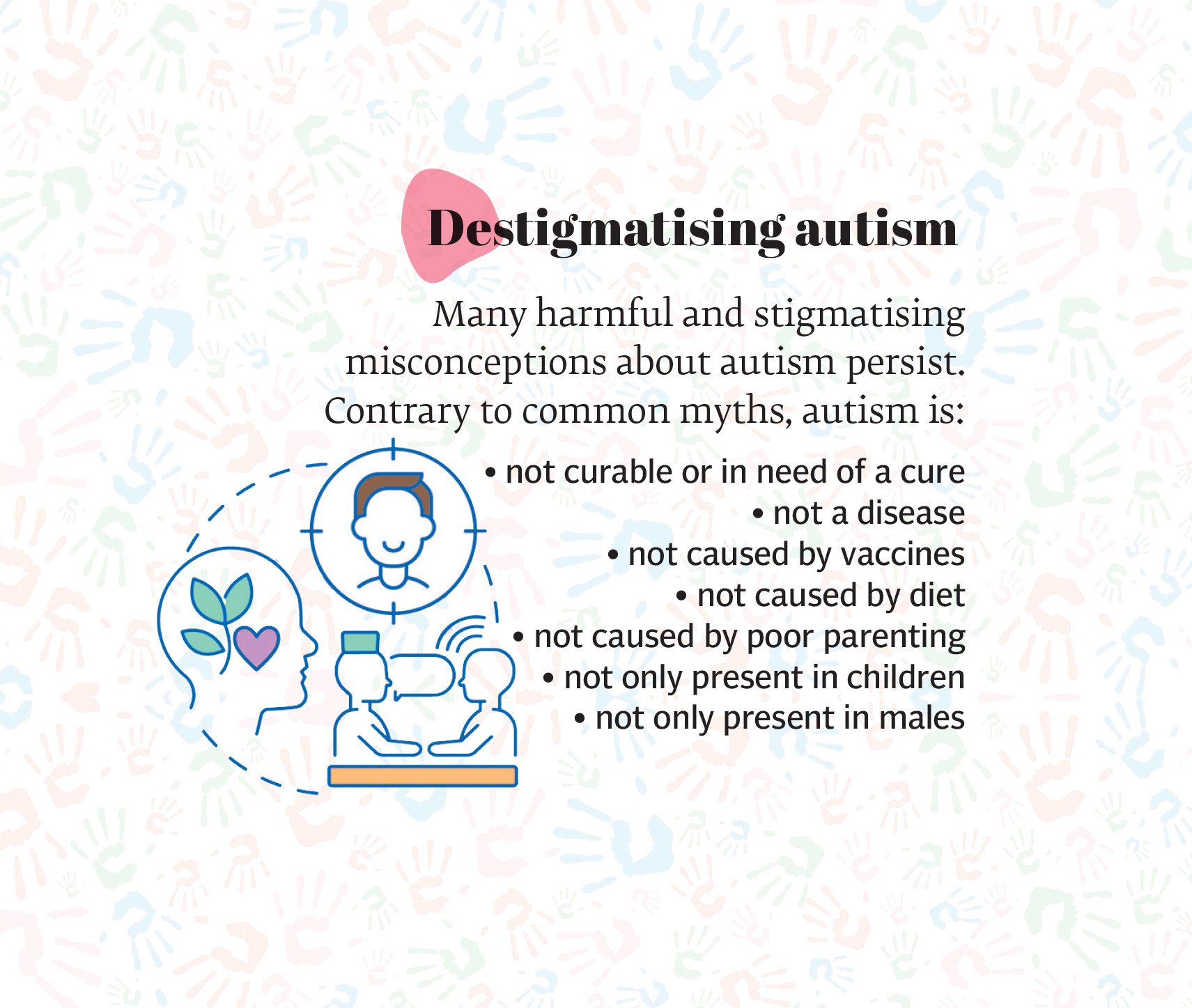
Lack of support
Taj Wali, a resident of Peshawar revealed that his 70-year-old father, Khan Wali had low-functioning autism; however, there were no support facilities for autistic adults in his city.
“Although the provincial government claims that health facilities are being offered to poor people, there are no support services for elderly people with autism. We have taken our father for check-ups at several clinics, but are simply told to keep him at home,” regretted Wali.
Sympathising with Wali, Dr Masooma Khan, a clinical psychologist, told The Express Tribune that no institution in K-P was providing treatment for elderly individuals with autism and even though the provincial government had established the Fountain Hospital in Hayatabad for the treatment of autism, it only catered to children and had a limited capacity of just 70 patients.
"Autism affects adults and elderly individuals just as it does children. Unfortunately, in rural areas, families often resort to tying up elderly autistic individuals or isolating them in separate rooms due to a lack of awareness and proper support facilities,” said Dr Khan, who emphasised the urgent need for a dedicated institution where elderly patients with autism could receive proper treatment and rehabilitation.
According to Nabila Chaudhry, the plight of autistic adults is no less bad in other parts of the country. “The entire focus of government initiatives is on catering for people with visible special needs such as physical disabilities, hearing and visual impairments. Thus, adults with (low-functioning) autism are usually considered unfit for employment by disability boards,” said Chaudhry, who conversely felt that the Punjab Act on Empowerment of Persons with Disabilities (2020) could be a game changer as it explicitly mentioned neurodivergent people.
Officials from the Punjab Labour Department claimed that the government had kept a quota for differently-abled people in all government and private industries. Meanwhile, efforts were made to contact K-P’s Minister for Social Welfare, Syed Qasim Ali Shah, however, despite multiple attempts, he refused to comment.
